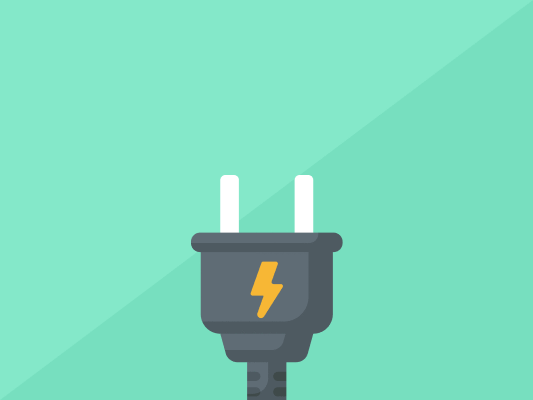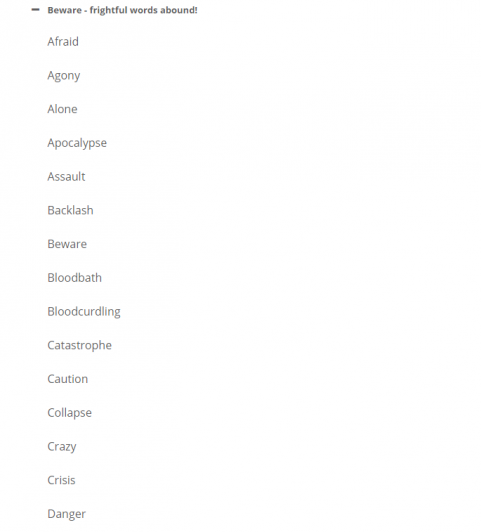Buying a product can be a tough decision. You must consider all pros and cons to make the right decision. But as it turns out, that is far from the reality…
You don’t buy because of all the benefits, pros and cons, etc. You buy because it feels right – because of emotions.
“83% of customers are more likely to purchase from a brand they have an emotional connection with.” – Iterable
Have you ever bought something only to later realize that it’s complete crap? That’s the power of emotions.
But how do you inject emotions into a marketing campaign?
You must use powerful words.
There are powerful words and phrases that stimulate emotions. They’ll make your customers obsessed with your product.
“Adding a few power words to the CTA increased conversions by 12.7%.” – Teespring.
Discover what power words and phrases make people tick.
Put them into your marketing campaigns and achieve your goals.
Today you’ll learn everything about the power of emotions and powerful words that come with them.
What Are Power Words?
Power words and phrases stimulate emotions.
They’re the sneaky little words that get into your customers’ mind. They make them imagine using the product, service, etc. Your customers will then create an emotional attachment, which will lead to a sale.
You can see an example of emotions in marketing below.

The powerful words combined with image stimulating fear.
Why Are Power Words Important?
Every sale starts with a thought.
You must make your customers aware of their problem. You’ll then need to make them imagine what a wonderful life would they have if they didn’t have that problem. Lastly, there’s a solution – your product.
There are 3 great benefits of using emotions in your marketing.
Higher Click-Through Rate
What do you think about the ad below?

While it may be interesting, it didn’t sell well.
The problem with that is that there’s no emotional attachment.
But what if we could add in little power words and an emotional picture and change it…

The results? – The weight loss product company saw a 47% increase in CTR.
The only thing they did was show an unflattering picture and used a few powerful words. It made their customers imagine themselves like that which reminds them of their issue and made them click.
Conversion Boost
The more they imagine using your product, the more sales you’ll get.
Consider the following example of an ad below.
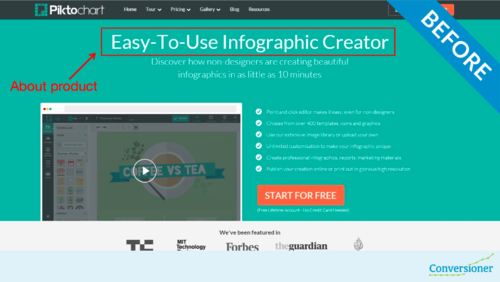
There are no benefits and you aren’t imagining anything – it conveys no emotions.
But, what if we could tweak it up a little…
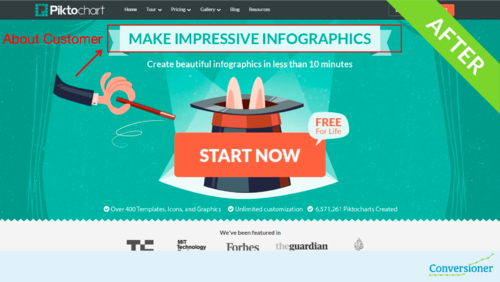
Let’s make it more vivid, actionable and add a few power words.
This version of the ad is much better.
You can see what you get immediately in the picture. You know where to click and the headline says it all.
The second variation increased conversions by 24%.
Having More Customers
If you’re looking to close more sales, emotions are the way to go.
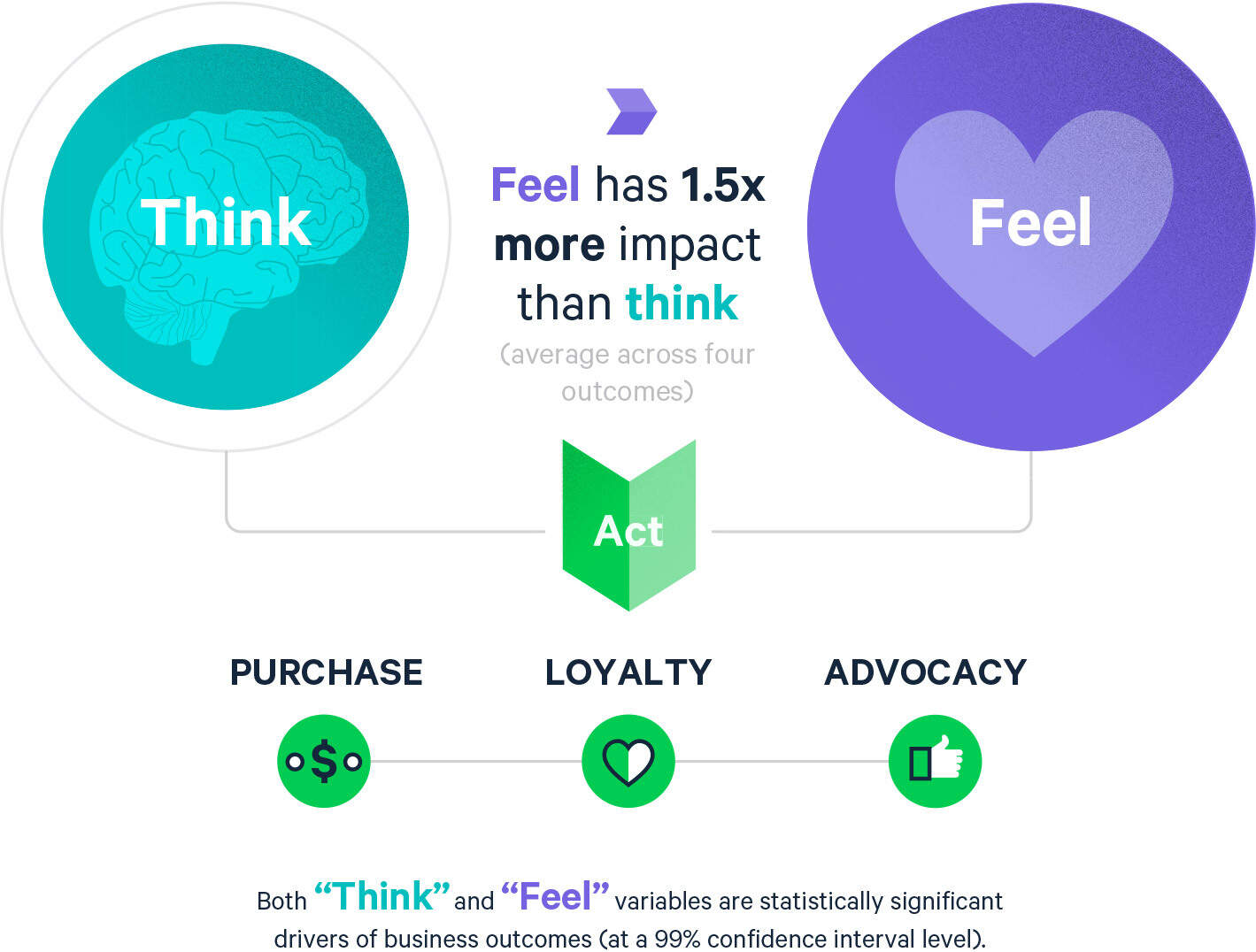
Your audience knows about your product, yet they haven’t made a purchase, why is that?
The most common reason is the lack of emotional attachment.
They’re fine being without your product. How to push them to make that purchase? You can fix that by sparking up emotions and make their imagination go wild.
How To Leverage Emotional Marketing?
The concept is simple – you make purchases fueled by emotions and later justified by logic.
As a marketer, how do you evoke emotions?
You must understand how the brain works to answer this question. We have 2 hemispheres – logical and emotional.
You must appeal to the right brain – the emotional one.
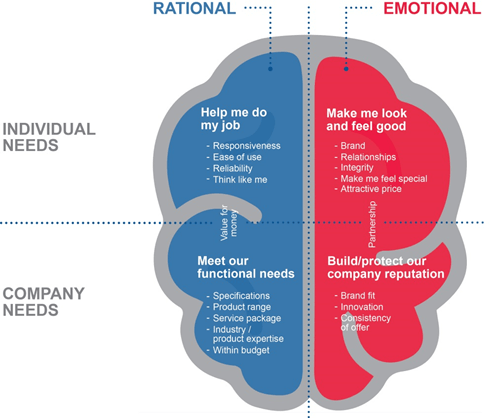
As you can see, the right side of our brain handles things that are very vivid, creative and imaginary.
As a marketer, you must use proper words that will make your customers think about the desired result and lead to a sale.
If you choose the wrong words, you evoke different emotions which can ruin the sale.
Fortunately, we’ll help you prevent that.
The Top 120 Most Powerful Words In Marketing
There are 2 approaches to emotional marketing.
- The negative approach – fear of loss
- The positive approach – the enjoyment of the desired results
We’ll look at both of them so you can pick the one that suits you.
We’ll talk about 6 primal human emotions. And you’ll learn about the 20 power words and phrases that come with each of them.
You’ll also see examples of successful campaigns using them.
Fear
The most powerful emotion is fear.
“If I don’t make a decision now, I’m toast.”
We don’t want to lose anything. In fact, we’d rather avoid losing than held on to it for something better later.

It’s our primal instinct that keeps us safe and alive.
You must appeal to your customers’ mind and make them feel like they’re losing on something if they don’t make a purchase now.
You can see a successful marketing campaign using fear below.
Case Study: WordStream Using Fear In Ads
WordStream ran 2 variations of an ad – a positive one and a negative one.
You can see both examples below.
The positive one:

The negative one:

The negative one used fear of wasting money.
It told you that if you aren’t using their product, you’re wasting your money.
The results?
The fear-based ad had a conversion rate that was 18.8% higher than the positive one. The click-through rate was 67.29% higher than the positive ad.
Powerful Words Evoking Fear

They’ll help you evoke fear and lead to a sale.
Shame
Shame can be a powerful motivator because we care about how other people perceive us.
We want to look perfect in the eyes of others.
“If I don’t make a decision now, I will look stupid.”
Using shame in marketing is about tapping into customers’ insecurities and exposing them.
You’ll then come up with a solution – your product, which will lead to a sale.
Case Study: Hylunia Using Shame In Sales Copywriting
Hylunia is an e-commerce selling acne treatments.
It sells products that help people look more beautiful and avoid an ugly face full of pimple – shame.
You can see an example of their store page below.
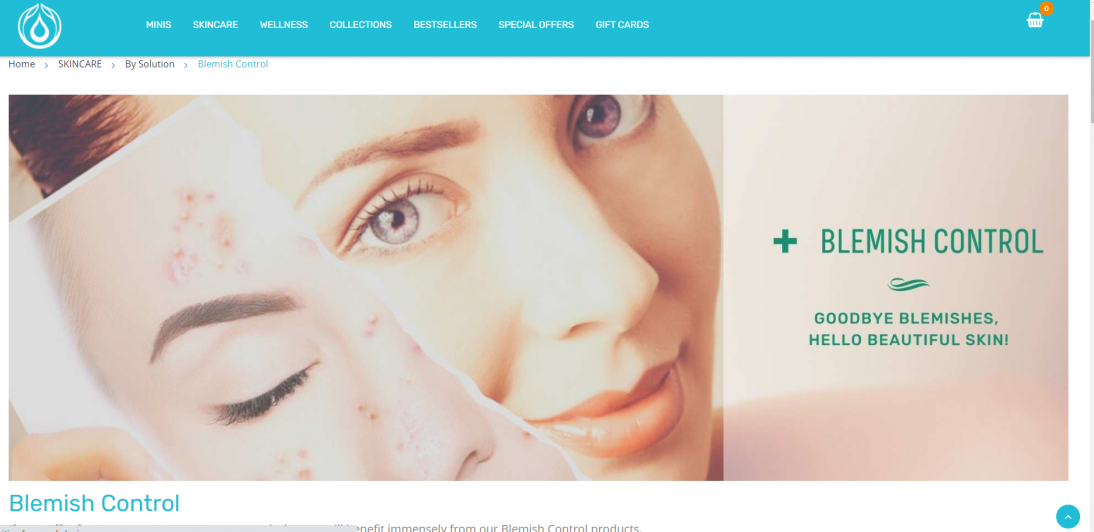
It’s basically saying – you shouldn’t feel beautiful if you have acne.
You should correct them with our treatment.
It’s subtle, yet, it preys on the readers’ vulnerability and compels them to make a purchase.
Power Words And Phrases Evoking Shame
Use the following words to evoke shame in your marketing strategy.
They’ll evoke shame in your customers and make them buy from you.
Pride
The opposite of the shame is pride.
“If I make a decision now, I will look smart.”
Everybody likes to brag about his or her accomplishments. We like to talk about ourselves and the smart decisions we made.
You can use it in marketing by positioning your product as an advancement in your customer’s life. Make it an easy solution that will make your customers’ life better compared to their peers.
Case study: Lyft – Earn Smart
We all drive a car and most of us own one.
What if you could use your car as a taxi and make a side income?
That’s exactly what Lyft offers.
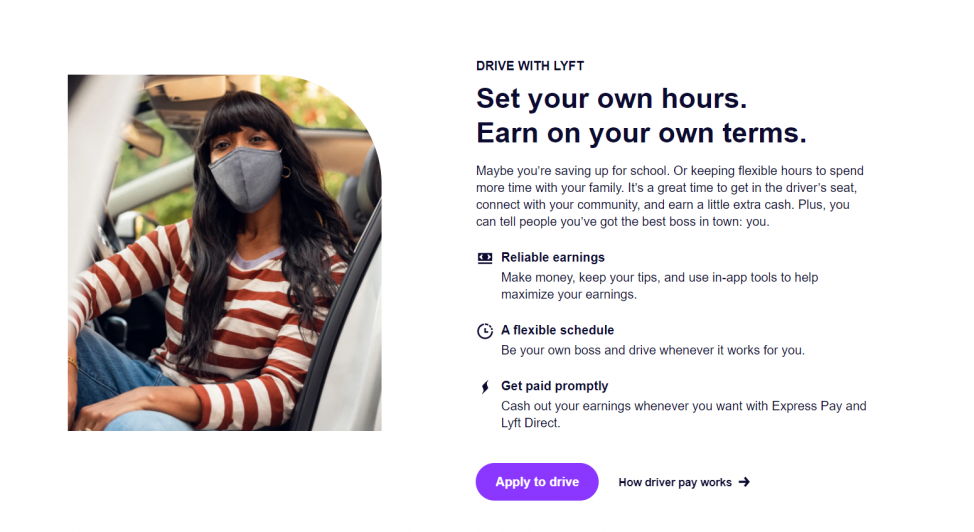
You’ll get an offer from people near you who need a lift. You’ll get to them, drive them to their destination and earn money. It’s an easy way to make money, yet only a few people know of this amazing opportunity!
You can tell your friends about it and be proud of yourself.
You know you got the job done If your new customers say, “Wow, why wasn’t I using that earlier? That’s so smart.”
Powerful Words And Phrases Evoking Pride
The following words can make your customer feel proud of the purchase.
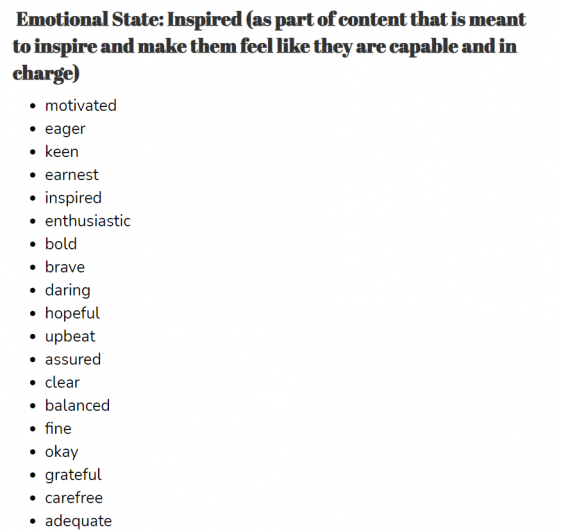
They’ll help you evoke pride and make people buy from you.
Greed
We are all greedy, whether we admit it or not.
We want a new car, house, clothes, etc.
We also want the best deals – that’s why we use discounts and shop on Black Friday.
There’s nothing wrong with it, it’s in our nature.
However, as a marketer, you should take advantage of that…
There are 3 ways you can use greed in your marketing:
- Emphasize personal benefits
- Give rewards for a buy
- Point out a return on investment
You can see a great example of using greed in marketing below.
Case Study: Air Bound Ads
Airbnb created an excellent advertisement by using greed.
They offer a $40 discount (reward) if you are referred by a friend. It’s an excellent strategy every business should use.

There are 3 great reasons why this is the best tactic.
- You’ll improve customer retention because you offer 2 months for free (reward)
- You’ll get new customers – getting a new customer is 5X more expensive than retaining a new one.
- You’ll get a referred customers – referrals have 69% faster time to close, a 59% higher lifetime value and 71% higher conversions.
Use greed in your marketing strategy and get more sales. You can do that by using discounts, freebies or referral programs.
Power Words And Phrases Evoking Greed
Use the following words to evoke greed in your marketing strategy.
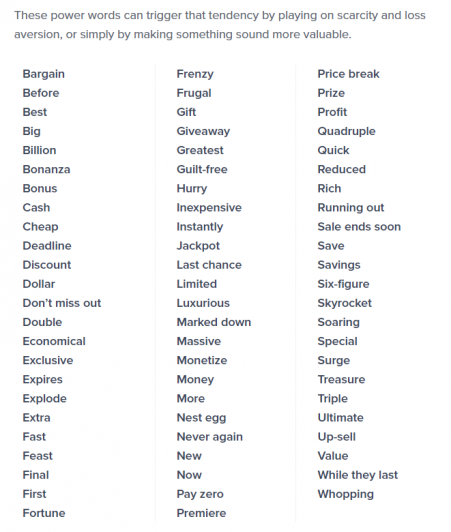
They’ll help you evoke greed and make people buy from you.
Envy & Jealousy
Everybody has been envious of someone at some point.
“If I don’t make a decision now, my competition will win.”
It can be a powerful motivator if your product can be the solution to your customers’ jealousy.
Show your customers that your product is what separates them from the competition.
Case Study: McDonald’s Ads Using Envy
McDonald’s has used envy very well in the ad below.
Every business has been outperformed by the competitors at some point. You were envious and jealous of them.
They stole your traffic and sales.
However, if you read the ad below, you’ll know they are trying to challenge Starbucks over their coffee sales.

You’ll beat them and get on top.
That’s how you should go about envy in advertising.
Find what is the source of your customers’ jealousy and position your product as a solution.
Altruism
Altruism is the opposite of being selfish.
It’s about showing kindness and making other people happy.
“If I make a decision now, I will help others.”
You must show your customers how their purchase will affect others. They must empathize with whatever you’re selling.
“Feelings of empathy led to altruism and the motivation to act on behalf of others.”
It’s about selling your product by promoting a higher purpose.
You’ll understand it better in the example below.
Case Study: Pampers Using Altruism
Pampers is the most popular company selling diapers.
You can see a great example of using altruism and emotions in their marketing campaign below.
They’re selling diapers for kids. But they’re selling it through a higher purpose – saving kids’ lives.
They don’t make their customers think about diapers.
Instead, they make them emotionally attached to saving kids’ lives.
It’s an excellent strategy that brought tons of sales.
They’ll help you evoke altruism and make people buy from you.
The Summary
You’ve learnt about the importance of using emotions.
“We buy with emotions and justify with logic.”
If you’re looking to increase conversions, you must have both things.
Your product must be a solution for your reader and you must spark up some emotions.
Unfortunately, most businesses fail to evoke any emotion in customers…
Don’t be like them.
Use the 120 power words and phrases we’ve talked about today and evoke emotions in your customers.
Boost your conversions, increase customer loyalty and stay on top.



